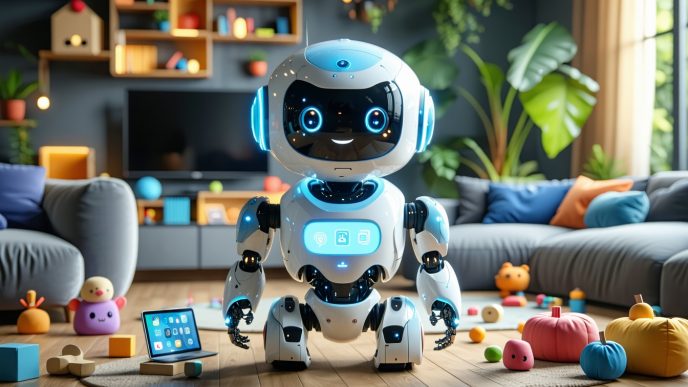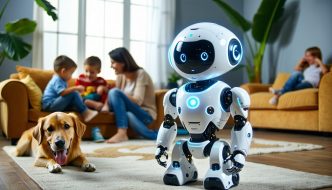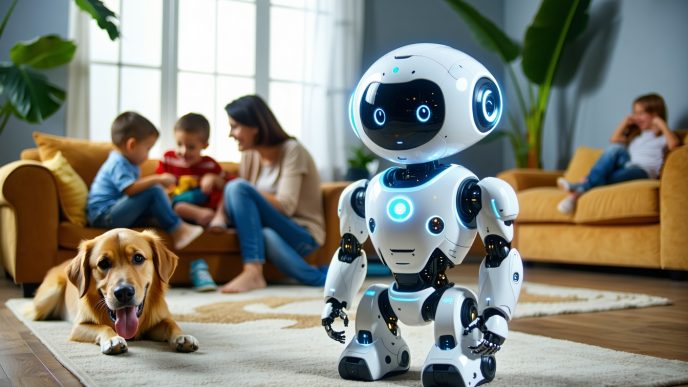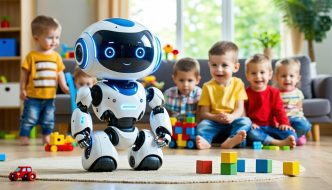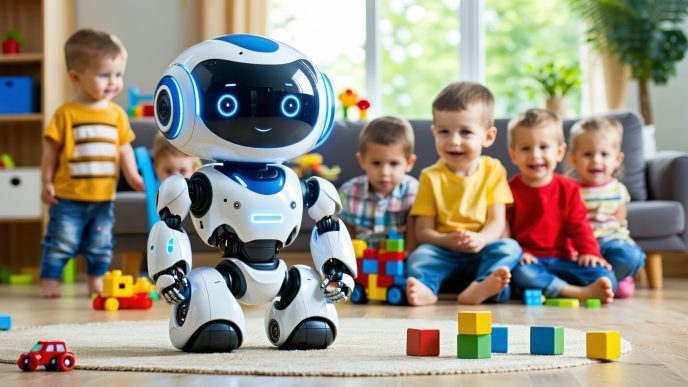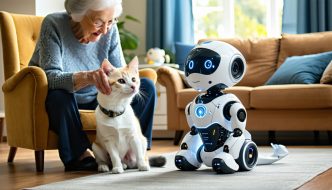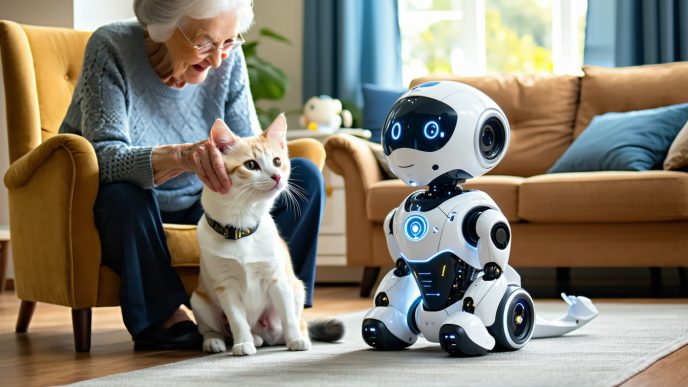The Evolution of Companion Robots
Introduction to Companion Robots
Companion robots have emerged as a vital aspect of modern robotic technology, designed to provide emotional support and companionship to individuals. These robots are increasingly recognized for their potential to interact naturally with humans, offering an alternative form of companionship that can enrich lives, especially for those who may feel isolated. With advancements in artificial intelligence, these machines are becoming more adept at understanding human emotions and responding appropriately.
Companion robots come in various forms, including non-humanoid designs, which focus on functionality over appearance. This evolution reflects a deepening understanding of the roles these robots can play, such as offering comfort, engaging in conversation, or assisting with daily tasks. As the demand for these supportive machines grows, the technology behind them continues to improve, making them more effective companions.
Importance of Emotional Intelligence in Robots
Emotional intelligence is crucial for companion robots to build meaningful interactions with users. This ability enables robots to detect emotional cues through voice tone, facial expressions, and body language, allowing them to respond empathetically. The rise of AI-powered emotional robots enhances their ability to provide support, particularly for vulnerable populations such as the elderly, individuals with mental health issues, and children.
The following table outlines the key benefits of emotional intelligence in companion robots:
| Benefit | Description |
|---|---|
| Improved Interaction | Emotional intelligence allows robots to engage in more natural conversations. |
| Enhanced Comfort | Users often feel more at ease when robots can respond empathetically to emotions. |
| Effective Support | Robots can offer timely assistance based on the user’s emotional state, enhancing overall well-being. |
With capabilities such as these, AI-powered emotional robots serve as significant partners in emotional companionship, leading to increased interest among caregivers, healthcare professionals, and tech-savvy consumers. For additional insights on how these robots provide support, explore articles related to robot companions for mental health and companion robots in assisted living.
Understanding AI-Powered Emotional Robots
The advent of AI-powered emotional robots marks a significant step in the evolution of technology designed to offer companionship and support. These robots leverage advanced artificial intelligence to interact with users in a manner that mimics human emotional understanding.
How AI Powers Emotional Robots
AI technology serves as the backbone of emotional robots, enabling them to recognize, interpret, and respond to human emotions. Several key functionalities are crucial in making this interaction possible.
| AI Feature | Description |
|---|---|
| Natural Language Processing | Allows robots to understand and generate human-like conversations. |
| Emotion Recognition | Uses sensors to detect facial expressions, voice tone, and body language. |
| Machine Learning | Enables the robot to learn from interactions, improving future responses. |
| Adaptive Behavior | Adjusts responses based on user feedback and emotional cues. |
These features allow emotional robots to create meaningful connections with users, whether they are in need of companionship, mental health support, or assistance in daily routines.
Features of Emotional Robots
Emotional robots come equipped with a variety of features designed to enhance user experience and effectiveness in providing companionship. Some notable characteristics include:
| Feature | Benefits |
|---|---|
| Voice Interaction | Facilitates natural conversations, making users feel heard and understood. |
| Visual Displays | Shows expressions or information through screens, enhancing emotional connection. |
| Customizable Personalities | Adapts to user preferences, making interactions more engaging. |
| Responsive Touch | Sensors that react to touch, creating a more interactive experience. |
These specific features are designed to address various user needs, including mental health support, companionship for seniors, and assistance for those dealing with memory-related conditions such as dementia. For more on these applications, consider reading about companion robots for dementia patients and robot companions for mental health.
The continuous integration of AI in crafting emotional robots signifies a leap towards creating technology that not only understands human emotions but also fosters meaningful relationships, enhancing overall well-being. For more insights into how these robots function, explore our articles on human robot bonding and companion robots in assisted living.
Applications of Emotional Robots
Emotional robots are increasingly being integrated into various aspects of life, providing valuable support in areas such as companionship, mental health, and care for aging family members. These AI-powered emotional robots can enhance the quality of life for many individuals and families by offering unique and versatile solutions.
Emotional Companionship
AI-powered emotional robots serve as companions, helping to alleviate feelings of loneliness and isolation. They can engage in conversations, respond to emotional cues, and provide interactive experiences. These robots are designed to understand and simulate basic social interactions, making them suitable for individuals who may benefit from companionship without the complexities of human relationships.
| Type of Robot | Features | Benefits |
|---|---|---|
| Simple Companion Robots | Basic conversation skills | Reduces feelings of loneliness |
| Advanced Interactive Robots | Emotion recognition, personalized responses | Enhances social engagement |
| Robot Pets | Playful interaction, emotional bonding | Offers comfort and joy |
For more insights, explore our article on companion robots.
Mental Health Support
Emotional robots have the potential to revolutionize mental health support by providing accessible assistance for individuals experiencing anxiety, depression, or stress. These robots can facilitate mindfulness sessions, engage users in therapeutic conversations, and monitor emotional states over time. They can also assist healthcare professionals by gathering data on patients’ emotional well-being.
| Support Type | Functionality | Potential Outcomes |
|---|---|---|
| Therapeutic Conversations | Engages users in dialogue to express emotions | Can reduce feelings of distress |
| Emotion Tracking | Monitors mood changes and behaviors | Helps in treatment adjustments |
| Mindfulness Assistance | Guides users through relaxation exercises | Promotes mental wellness |
To learn more about this application, check out our article on robot companions for mental health.
Assistance for Aging Family Members
AI-powered emotional robots are particularly beneficial for aging family members, providing non-intrusive assistance that can enhance independence. These robots can remind users to take medications, monitor vital signs, and offer companionship. By reducing the need for constant human supervision, these robots can also give caregivers more flexibility, resulting in improved quality of care.
| Task | Robot Capability | Benefits to Seniors |
|---|---|---|
| Medication Reminders | Alerts for medicine schedules | Ensures adherence to treatment |
| Vital Sign Monitoring | Tracks health metrics | Enables early detection of issues |
| Social Interaction | Engages in conversation | Reduces feelings of isolation |
For further reading on how these robots assist seniors, visit our article on robot pets for seniors.
The innovative applications of these emotionally intelligent robots highlight their potential to support individuals across various settings, contributing to improved well-being in both social and healthcare environments.
Benefits of Emotional Robots
Emotional robots equipped with advanced artificial intelligence (AI) offer various benefits, particularly in enhancing overall well-being for individuals, especially those dealing with loneliness, mental health issues, or routine care challenges. This section delves into the significant advantages provided by these innovative machines.
Reducing Loneliness
One of the primary benefits of AI-powered emotional robots is their ability to alleviate feelings of loneliness. For many individuals, especially seniors and those living alone, the presence of a companion robot can create a sense of connection and companionship. These robots can engage in conversations, offer suggestions for activities, and even remind users of important events, making them feel valued and less isolated.
| Benefit | Description |
|---|---|
| Companionship | AI-powered emotional robots can simulate conversation, helping users feel less lonely. |
| Engagement | Interactive features encourage users to participate in various activities. |
| Reminders | Robots can send notifications for social events or personal milestones, promoting social connectivity. |
For further details on how these robots can benefit seniors, refer to our article on robot pets for seniors.
Providing Comfort and Support
Emotional robots are designed to provide comfort and reassurance. Many individuals struggling with mental health issues benefit from the non-judgmental support that these machines can impart. They are programmed to respond to emotions and can adapt their behavior based on the user’s mood, offering empathetic responses and encouraging messages.
| Aspect | How It Helps |
|---|---|
| Emotional Responses | Robots can recognize emotional cues and respond in supportive ways. |
| Stress Relief | Engaging with these robots can reduce anxiety and provide a comforting presence. |
| Encouragement | Robots can provide motivational messages, fostering a positive outlook. |
For more on the use of robots in mental health, see our article on robot companions for mental health.
Assisting with Routine Care
Beyond emotional support, AI-driven emotional robots can assist with daily living tasks. They can help individuals stay organized by providing reminders for medications, appointments, and other routine activities. In assisted living situations, these robots can play a crucial role in promoting independence among residents.
| Routine Care Benefit | Description |
|---|---|
| Medication Reminders | Robots can alert users when it’s time to take medication, ensuring compliance. |
| Activity Tracking | Keeping track of daily activities helps maintain a structured routine. |
| Assistance in Communicating | Robots can facilitate interactions with family members and healthcare providers. |
For insights on how these robots function in assisted living environments, refer to our article on companion robots in assisted living.
AI-powered emotional robots are changing the landscape of emotional support, and their potential benefits for reducing loneliness, providing comfort, and assisting with daily care are vital to improving the lives of many individuals. Understanding these benefits can assist caregivers and families in making informed decisions regarding emotional companionship for their loved ones.
Ethical Considerations
As the development of AI-powered emotional robots advances, ethical considerations surrounding their use become increasingly important. Two main issues arise: privacy concerns and dependence on technology.
Privacy Concerns
With emotionally intelligent robots often collecting personal data to enhance their interactions, privacy becomes a significant concern. These robots may monitor user emotions, preferences, and daily routines, which raises questions about data security and consent. Users must be informed about what data is being gathered, how it is used, and whether it is shared with third parties.
| Data Collection Aspect | Description |
|---|---|
| Type of Data | Emotional state, interaction duration, daily routines |
| User Consent | Users must agree to data collection policies |
| Data Security Measures | Encryption, secure storage, and access controls |
Ensuring robust data protection measures is crucial for building trust and fostering a positive relationship between users and their robotic companions. For more on the impact of robots in this context, visit our article on human robot bonding.
Dependence on Technology
The increasing reliance on AI-powered emotional robots may lead to concerns regarding human dependency on technology. While these robots can provide invaluable support, such as companionship and assistance for aging family members, excessive reliance could undermine traditional human connections.
| Potential Dependency Issues | Impact |
|---|---|
| Reduced Social Interaction | Isolation from friends and family |
| Impact on Caregiver Roles | Shifting responsibilities from caregivers to robots |
| Emotional Attachment to Robots | Risk of preferring robotic interactions over human relationships |
Maintaining a balance between utilizing emotional robots for support and fostering real-world relationships is essential. For those interested in how robots are aiding different demographics, check out our articles on robot pets for seniors and companion robots for dementia patients.
By addressing privacy concerns and technology dependence, developers and users can work together to create a future where AI-powered emotional robots provide meaningful support without compromising ethical standards.
Future of Emotional Robots
Advancements in Emotional Intelligence
The future of ai powered emotional robots holds promising advancements in emotional intelligence. These robots will increasingly learn to understand and respond to human emotions with greater accuracy. Through improved algorithms and machine learning techniques, they will analyze verbal and non-verbal cues to enhance their interaction capabilities.
One significant advancement is the integration of natural language processing (NLP), allowing robots to engage in more meaningful conversations. This enables them to provide emotional support tailored to individual needs. Additionally, advancements in facial recognition technology will help robots decipher emotional expressions, further facilitating empathetic responses.
| Technology | Description |
|---|---|
| Natural Language Processing | Enhances conversational abilities and emotional understanding. |
| Facial Recognition | Analyzes facial expressions to gauge emotional states. |
| Machine Learning | Improves response accuracy based on user interactions. |
As these technologies evolve, emotional robots will be better equipped for various applications, including companionship, mental health support, and assistance for aging family members. This integration can significantly transform the caregiving experience, making it more responsive and personalized.
Potential Impact on Society
The emergence of emotionally intelligent robots is poised to have a profound impact on society. One area of significant influence is mental health support. As these robots become more sophisticated, they can offer companionship to individuals struggling with loneliness or social anxiety. By providing consistent emotional support, they can ease feelings of isolation, especially among older adults or those living in assisted living environments. For more information about their role in assisted living, refer to our article on companion robots in assisted living.
Another crucial development is the role of these robots in caregiving scenarios. They can assist family members looking after elderly parents or relatives, offering companionship and helping with daily routines. This support can greatly relieve caregivers, allowing them to focus on other essential aspects of care. For insights on how these robots can benefit seniors, explore our article on robot pets for seniors.
The societal implications extend beyond individual benefits. As emotional robots become integrated into various facets of healthcare and senior care, there may be shifts in workforce dynamics. These robots could serve alongside human caregivers, enhancing the overall care experience. However, the emergence of such technology also raises ethical considerations regarding the balance of human and robotic interaction and potential emotional dependence on these devices.
In summary, the advancements in emotional intelligence technology for robots present exciting possibilities, including but not limited to improving mental health and enhancing caregiving. As society adapts to these innovations, careful thought must be given to ethical implications. Embracing the potential of these ai powered emotional robots may pave the way for more enriched and supportive environments.





